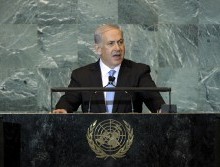The growing diplomatic debate between Israel and other nations in the West over how to prevent Iran from going nuclear is escalating, but it’s unclear what direction it’s ultimately taking. Israeli Prime Minister Benjamin Netanyahu, in some of his most transparent comments to date, urged the international community on Monday to set up a “clear red line” on Iran’s nuclear efforts.
So far the international community is sending mixed signals on the matter. Less than one week after the top US military official said he did not want to be “complicit” in an Israeli attack on Iran’s nuclear program, France said such a strike could be a mistake. However, a US news report says the Obama administration is weighing new approaches to Iran.
French Foreign Minister Laurent Fabius told BFM TV, in comments re-reported by Israel’s Haaretz newspaper, “I’m absolutely hostile to Iran having nuclear weapons but I think that if there were an Israeli attack, unfortunately it could come back to haunt Israel by (allowing) Iran to cast itself as a victim.”
Those comments follow similar words from US Chairman of the Joint Chiefs of Staff Gen. Martin E. Dempsey, who according to The New York Times warned that the international unity against Iran “could be undone” by a premature Israeli attack.
“I don’t want to be accused of trying to influence, nor do I want to be complicit if they choose to do it,” the Times quoted Dempsey as saying regarding Israel striking Iran.
Netanyahu seemed to express growing concern at such comments on Monday, publicly calling for a more defined “red line” from the world on Iran.
“Right now the biggest threat we’re all facing is Iran’s plans to develop nuclear weapons-capability. This is a brutal regime that is racing ahead with its nuclear program, because it doesn’t see a clear red line from the international community,” Neatanyahu was quoted by a press statement as saying.
“And it doesn’t see the necessary resolve and determination from the international community. The greater the resolve and the clearer the red line, the less likely we’ll have conflict.”
Conflicting Reports
Depending on the media read, the US is either considering just such a step up in rhetoric on Iran, or has in fact undercut an Israeli threat by offering a backdoor deal with Tehran.
The Israeli newspaper Yedioth Ahronoth, in a report carried by their Ynet English website, said the US has informed Iran through European nations that in exchange for not attacking US forces and facilities in the Middle East, America won’t back an Israeli military strike on Iran’s nuclear program that could lead to a regional war.
The New York Times, however, reported that there is debate in the White House over how President Barack Obama should approach red lines and consequences for Iran beyond just saying they won’t accept a nuclear-armed Iran.
Iran has reportedly researched nuclear weapons-related technology and made progress in other components of a nuclear bomb, particularly uranium nuclear fuel-enrichment. While not yet believed to have reached weapon’s grade fuel, Iran has done a large portion of the work towards that possible goal. Hence Israel’s concern about where the red lines lie, short of Iran actually developing a bomb.
The Times also reported the US is planning defensive activities in the Middle East to send Iran a message and could escalate covert or cyber-operations against Iran’s program as well.
(By Joshua Spurlock, www.themideastupdate.com, September 3, 2012)

